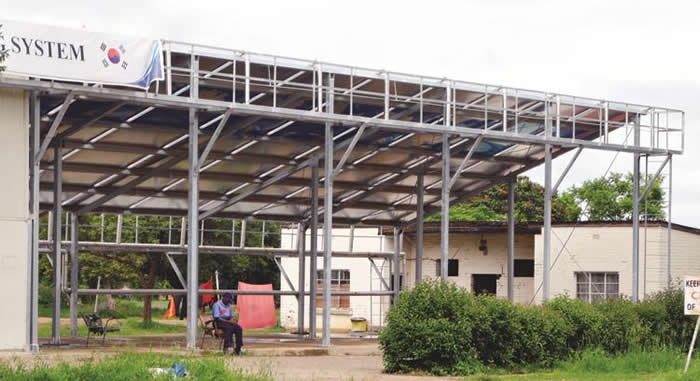
The Sunday News

 The United Bulawayo Hospitals solar water-heating plant constructed with the aid of the Republic of Korea International Co-operation Agency (KOICA) in 2013
The United Bulawayo Hospitals solar water-heating plant constructed with the aid of the Republic of Korea International Co-operation Agency (KOICA) in 2013UNITED Bulawayo Hospitals (UBH) says it has been saving about $16 000 every month in electricity bills since the installation of a state-of-the-art solar water-heating plant at the institution in 2013.
The solar water-heating system project was funded by the Republic of Korea in a pilot phase and UBH is the only central hospital in the country that has a facility of this kind.
Mrs Nonhlanhla Ndlovu, the hospital’s chief executive officer, told the Sunday News about the electricity-saving mechanism.
“According to our public works department, we are saving about $16 000 each month in terms of electricity. This system is really working for us and we appreciate the gesture as we have fewer debts with the power utility now,” she said.
The solar system which is powered by almost 100 solar panels and a 10 000 litre storage tank is connected to Lady Rodwell Maternity Home where there is great need for hot water.
“It is connected to the maternity home as we are very passionate about maternal health care. We felt we must connect it there as they have the greatest need for hot water in the whole institution,” she said.
According to the hospital’s operations manager, Mr Fabian Mashingaidze, solar energy heats up water into the 10 000-litre tank that is connected to the maternity home.
“The water is heated up in a tank and channelled to the maternity home. The system is an automatic one that enables it to regulate itself when the heating is done and it switches itself off,” he said.
The hot water is used for bathing at the maternity home by expectant and new mothers.
The CEO also explained that they had a heating system that was also installed in the wards.
“There is a special care baby unit here where we have the premature babies and other babies that need special attention. Health standards require that the room be kept very warm, so we have installed some tubing that keeps the room warm and it is powered by the solar energy,” she said.
The Kangaroo unit at the maternity home also houses new born babies that also need to be kept warm and the heat is generated from the solar water-heating system into the ward.
“Before the solar system was installed we were using heaters to keep the babies in the two units warm and it was very dangerous as we were at risk of starting fires as it was a naked source of heat. It was also very costly to have heaters on 24 hours a day but now all that has changed and we are happy about it,” said Mrs Ndlovu.
The solar system is operating at 40 percent capacity and the hospital is planning to use the rest of the power.
“We are only using 40 percent of power and we intend to connect this system to the main hospital so that we fully utilise this heating system so funds permitting, we will pipe the water to the main unit by the end of the year,” Mrs Ndlovu said.
The solar water-heating system was constructed at a cost of $400 000 and is linked to the Republic of Korea via the internet.
“This system is linked to the Korean engineers who installed it and they assist us in trouble shooting from that end, so we have very little challenges when faced with a problem about the system,” said the CEO.
The institution, in a quest to reduce costs and have the most convenient service provision, is in the process of connecting a gas pipe to the hospital that will carry oxygen for the patients.
“It is cheaper to install large gas tanks like we did here because we do not have to move around with small tanks to the suppliers of the oxygen and again the supplier is downsizing. Gas is only available in Gweru and other faraway places so we have actually saved ourselves by starting this project,” Mrs Ndlovu said.
UBH and Harare Institute of Technology are the only two institutions in Zimbabwe to have the public solar water heating system.
According to research, Zimbabwe is in one of the best solar radiation belts in the world with about 300 days of sunshine per year.
Solar energy is, however, said to be underutilised in light of the fact that the country faces electricity outages regularly.



